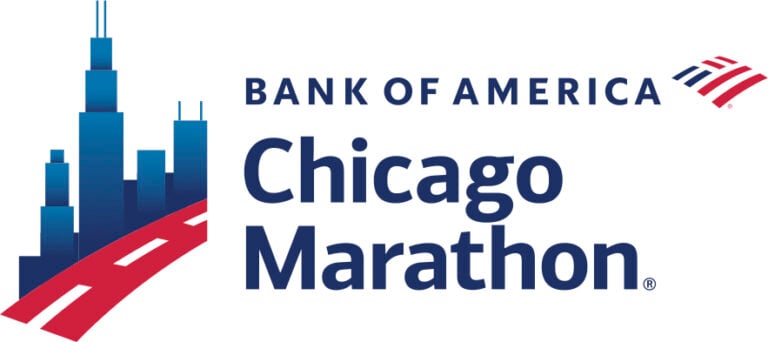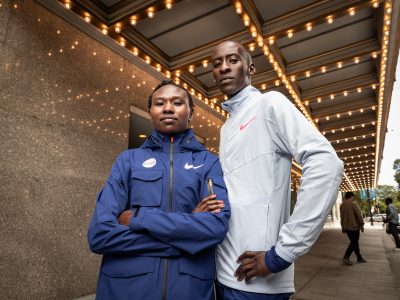Ruth Chepngetich Plans on 66:00 or Faster First Half, Kelvin Kiptum Details His Buildup, & Why Sifan Hassan Ran Those Post-Race Workouts in Budapest
Plus Conner Mantz has thoughts on the Olympic Marathon Trials and the qualifying system
By Jonathan GaultCHICAGO — Friday was media day at the 2023 Bank of America Chicago Marathon and there was plenty to discuss. Galen Rupp, in his first marathon in nearly a year, said he is finally pain-free after overhauling his running form and is ready to run fast. Emma Bates and Emily Sisson are both in the shape of their lives and could produce the first marathon ever with two American women under 2:20. And a favorable forecast could produce some super fast times on Sunday at the front of the field.
Here’s what we learned after a couple hours doing the rounds with the pros on Friday morning.
Conner Mantz says he’s ready to run the standard but has some issues with the Olympic qualification process
Last year in Chicago, Conner Mantz ran 2:08:16 in his marathon debut. If he runs six seconds faster on Sunday, he will hit the Olympic standard and ensure that the United States has at least one men’s marathoner in Paris next year. All indications are that Mantz’s training has gone well, and his coach Ed Eyestone believes a great race could see Mantz run 2:07 or even faster.
“If I run my race plan and I pace it out well and I make sure I get my bottles, I’m pretty confident I’ll be under the time,” Mantz said.
But if something goes wrong on Sunday — and it can happen even after a great buildup, just ask Scott Fauble — things could get complicated for Mantz and every other American marathoner. Until recently, many — including LetsRun.com — were under the impression that Mantz had little to worry about when it came to Olympic qualification. When limiting it to three athletes per country — as World Athletics does for Olympic qualification — Mantz is currently ranked 45th in the world rankings. The top 64 in the Road to Paris list (world rankings + auto standards from countries not already represented) as of January 30, 2024, all earn qualification spots for their countries at the Olympics. All good, right?
No, actually. As James McKirdy pointed out, only times run on or after November 1, 2022, are considered as part of the Road to Paris rankings. So Mantz’s 2:08:16 from 2022 Chicago doesn’t count. He needs another good marathon on Sunday to give him two marathon performances within the ranking period (though he could also get points from his his 61:12 at the Houston Half in January).
Mantz was asked today about his thoughts on the Olympic Trials starting at noon in Orlando on February 3. He said that if no Americans have the 2:08:10 standard by that point and it’s a hot day, it’s going to be a problem — because it will be unlikely any Americans hit the standard at the Trials. And in that case, he wondered, “Does it make sense for him to run the Trials at all?”
“I especially don’t like the start time at noon if it’s going to be warm and no Americans have run the standard,” Mantz said. “It just opens up a can of worms. Maybe we’ll get in off rankings. But if that point, what if we have nobody in the race with the qualifier, do I just go and run London and go and run 2:08 there, then do I get to go? Or does that [spot] just go to the winner of the Trials?”
Mantz and Eyestone have asked USATF what would happen in the latter scenario but have yet to receive an answer. Mantz was then asked with he was okay with the possibility of him being the only American to earn the Olympic standard during the window and USATF sending the winner of the Trials to Paris in his place (assuming someone beats Mantz) — filling a spot that, under this scenario, would not exist without Mantz earning it.
“I’m not, but also I have to think, what if I bonk on Sunday and then I show up to the Trials and win?” Mantz said. “Then it’s like maybe I take somebody else’s spot. I don’t like it, but it’s the rules we have to play by.”
It’s a lot to take in, but Mantz would rather focus on executing a good race on Sunday than wondering about hypotheticals. Only five Americans in history have run 2:08:10 faster, and none have ever done it in the same race. With good marathoning conditions in the forecast on Sunday, Mantz believes that could change.
“I think there’s a good chance that at the end of this weekend, I think we have three people [qualified],” Mantz said. “Because I feel good, [training partner] Clayton [Young] looks good in workouts, Galen Rupp, on his on day, he’s going to run that fast.”
Ruth Chepngetich plans on running her first half between 65:40 and 66:00
Last year, Ruth Chepngetich went out in 65:44 for her first half — more than a minute under world record pace — but faded to 68:34 over the second half. She still ran 2:14:18 — the second-fastest time ever at the time — but missed the world record by 14 seconds and probably would have gotten it with more even splits.
After Tigst Assefa‘s 2:11:53 world record in Berlin two weeks ago, 65:44 no longer looks like an insane opening half split. Once again, Chepngetich will have male pacers to help her out, and she said on Sunday she will be targeting a similar split for halfway — somewhere between 65:40 and 66:00. And this time, she does not plan on slowing down.
“For this year, I’m hoping to be the same as last year but the second half maybe I will try to be a little bit faster,” Chepngetich said.
Chepngetich is not billing this is a world record attempt, but considering world record pace is 65:56, it would not be a shock to see Chepngetich challenge the mark on Sunday. To even come close, Chepngetich knows, will take a huge effort.
“2:11 is not easy,” Chepngetich.
But she also believes that, one day, women will run even faster.
“In future, women can run 2:09, 2:10,” Chepngetich said.
Sifan Hassan is curious to learn what it’s like to run a marathon six weeks after tripling at Worlds
When Sifan Hassan tries something crazy — which happens a lot — she doesn’t think about what gives her the best chance to win a gold medal or run the fastest time. She thinks about things that excite her, the sort of questions that for other athletes remain strict hypotheticals. What would happen if I tripled at the Olympics? What would happen if I ran the London Marathon without really doing marathon training?
For Chicago, the question that motivated Hassan was what would happen if she ran a marathon just six weeks after tripling in the 1500 (bronze), 5,000 (silver), and 10,000 (11th) at the World Championships in Budapest.
“More than break a record or win the race, I’m really curious what I’m going to do [on Sunday],” Hassan said.
The last time Hassan tripled at a major championship, winning two golds and a bronze at the 2021 Olympics, it took her eight months to return to full training. So how is it that she is running Chicago without taking any break since Budapest?
Hassan explained that it was not just the physical stress of Tokyo that required a lengthy reset, but the emotional stress too.
“Tokyo, it was my goal, it was my dream to do three distances and I was thinking [about it for] more than a year working hard,” Hassan said. “Once you get what you want, you get crashed. I was crashed after that. I was really focusing everything. But in Budapest, I did for fun.
“…I wasn’t really 100% in Budapest mentally. I was really thinking about the Chicago Marathon. I know I wasn’t ready at 1500, I know I wasn’t ready at 5,000 meters. Probably I was ready at 10,000 meters because I already had marathon training, but I was like, this is for fun. If it goes well, it is good. If it does not go well, who cares? It’s life.”
That infamous track workout Hassan ran after the 1500 final in Budapest? She said it was to keep her volume up for Chicago.
That’s not to say everything went smoothly in between Budapest and Chicago, but Hassan believes it will be easier for her to go from the marathon to the track than the track to the marathon because the latter does not involve any sharpening when it comes to getting ready for a kick.
As for Sunday’s race, Hassan seemed unfazed when we told her Chepngetich plans on going out in 66:00 or faster. As usual, Hassan is not worried about the consequences — she’s just interested in seeing what will happen.
“I will go with her and see what I can do,” Hassan said.
Kelvin Kiptum: “It was a little bit less [training], but I’m fit”
Kiptum confirmed that his Chicago buildup did not go perfectly — he missed some time at the start with a groin injury and the rainy season meant some of his dirt road runs were muddier than usual. But he still thinks he is in good shape and fit enough to break Dennis Kimetto‘s 10-year-old course record of 2:03:45. He said he does not have a target split in mind and does not know what pace the rabbits have been assigned.
“I think I have trained good,” Kiptum said. “It was a little bit less [training] but I’m fit for the race.”
In addition, Kiptum, who had previously said he was self-coached, today he revealed that he actually does have a coach in his training base of Chepkorio. We didn’t catch the name but Kiptum said his coach has taken on a bigger role since his win in Valencia last year.






